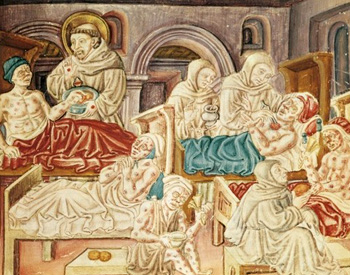Organic Society
 |
 |
 |
 |
 |
 |
 |
Peace, Equal States & Slavery
There is a correct way to understand peace and the union of nations. In theory the Church would like to have a universal peace. She also would like to have a world without pain, disease and suffering. But the Church knows that, because of Original Sin, in practice a universal peace on this earth is impossible to attain.
No matter how strongly she preaches on personal virtue, the practice of those virtues reaches both high and low points in men and in peoples. When the practice of virtue is low, men go astray and peace fades away.
 It is more or less like what happens with diseases. The Church would like to abolish all diseases, and no one has done more than she to improve health and combat sickness. But, she knows that disease will always be present among men. For this reason, on the practical level she does not dream about abolishing all illnesses.
It is more or less like what happens with diseases. The Church would like to abolish all diseases, and no one has done more than she to improve health and combat sickness. But, she knows that disease will always be present among men. For this reason, on the practical level she does not dream about abolishing all illnesses.
So also, she does not dream, in practice, about establishing a universal peace. She encourages peace as much as possible, but she does not pretend to have a concrete plan to establish a universal peace.
Further, from the spiritual point of view, it would actually be harmful to eliminate all diseases because the world would fall into an abyss of immorality. Sickness plays an enormous role in maintaining morality in society and order in the world. A world where no one would be sick would be frightening; with Original Sin a world where no one would die would end by becoming a jungle. It would be tantamount to expelling God from the world.
Thus, the Church always strove to establish peace and eliminate disease as much as she could, but she always knew that peace and health are precarious states.
Even when a man cares about his health, he does not proclaim that he will never die – this would be foolish since everyone knows that he will die. He himself knows that he will die, but he wants to prolong his life as much as possible. This is normal and good; he has a right to do so and he receives the blessings of the Church for doing this.
The egalitarian myth & the State
The USA and Brazil are federations. In both countries each State has equal, standardized bonds with the Union. This is, however, a mistake. Each of these States that are part of the Federation has a different history, different capacities to develop itself, a whole set of different problems and, therefore, has a greater or lesser need for the assistance of the Central Power.
Each State’s relationship with the Union should be regulated through special precepts and agreements. To standardize all the States by implementing the same regulations is wrong. The differences in each State should be reflected in their relationships with the Union.
For example, the Central Power aims to establish equality among the States. So, in Brazil each State has the right to have three senators. The same system is used in the U.S. where each State has two senators. In practice, what happens is that a State with great importance and dynamism such as São Paulo has the same number of senators as Roraima, which is a very new State. Thus, São Paulo with its 44 million inhabitants and its almost 500 years of history has three senators and Roraima with its 500,000 inhabitants and its 30 years of existence has the same number.
 The result is that, based on the ideal of combating aristocracy and inequality, the Central Power is actually promoting a misguided inequality because it is giving greater importance to those States that are not in the same level of the decisive ones. The result penalizes the more dynamic and competent States and privileges the less important ones. It is an aristocracy of the less significant.
The result is that, based on the ideal of combating aristocracy and inequality, the Central Power is actually promoting a misguided inequality because it is giving greater importance to those States that are not in the same level of the decisive ones. The result penalizes the more dynamic and competent States and privileges the less important ones. It is an aristocracy of the less significant.
It would be better for the Central Power to make different individual agreements with each State. If, for example, the State of Illinois in the U.S. offered a greater service during war time, it should receive the privilege of having more senators. Should another State, let us say Massachusetts, become famous for its great universities, the Central Power should add more senators to represent it. It would be very fair to recognize moral values that could justify a greater representation in the Senate.
Why not give more rights to the Southern States that suffered persecution due to a revolutionary principle? They would deserve to have a special registry in the history of the Country. Today, I have the impression that even the Southern States would not agree with this because their mentalities have been completely transformed.
Gradual process of abolishing slavery
By making this proposal, I am not taking a position favorable to slavery, as someone might object. It has been proved that the real cause of the War of Secession was not to free the slaves. Rather, the war was instigated over which system should have supremacy: the patriarchal society of the South or the industrial society of the North.
Historians today demonstrate that the problem of slavery was already in the process of being resolved before the Civil War. Thus, the aggression of the North against the South could actually be characterized as a “Crusade” against that Organic Society and that aspect of Christian Civilization represented by the South.
 In Brazil also there were ongoing measures to liberate the slaves before slavery was abolished. For example, the “law of the free womb” had been approved, which legislated that a child born of a slave mother would automatically be free. It was a legal provision that de facto would abolish slavery in the next generation. That was the correct way to gradually do away with slavery. With this process, the necessary adaptations for the slaves and the owners were being made.
In Brazil also there were ongoing measures to liberate the slaves before slavery was abolished. For example, the “law of the free womb” had been approved, which legislated that a child born of a slave mother would automatically be free. It was a legal provision that de facto would abolish slavery in the next generation. That was the correct way to gradually do away with slavery. With this process, the necessary adaptations for the slaves and the owners were being made.
However, that process was interrupted by the sudden liberation of all slaves with the law decreed by Princess Isabel. Today we know that she was being strongly pressured to make that act by Pope Leo XIII, who had prepared an encyclical against slavery (In Plurimis, 1888) and sent a strong message to her government, which was essentially this: “Either you abolish slavery now, or I will cite you as an example of propagating the slavery I condemn.”
The result was that slavery was abolished prematurely, interrupting the organic process that was already taking place. This sudden rupture caused social and economic traumas:
Posted October 19, 2018
No matter how strongly she preaches on personal virtue, the practice of those virtues reaches both high and low points in men and in peoples. When the practice of virtue is low, men go astray and peace fades away.

The Church always fought against diseases; above, Franciscans helping the sick
So also, she does not dream, in practice, about establishing a universal peace. She encourages peace as much as possible, but she does not pretend to have a concrete plan to establish a universal peace.
Further, from the spiritual point of view, it would actually be harmful to eliminate all diseases because the world would fall into an abyss of immorality. Sickness plays an enormous role in maintaining morality in society and order in the world. A world where no one would be sick would be frightening; with Original Sin a world where no one would die would end by becoming a jungle. It would be tantamount to expelling God from the world.
Thus, the Church always strove to establish peace and eliminate disease as much as she could, but she always knew that peace and health are precarious states.
Even when a man cares about his health, he does not proclaim that he will never die – this would be foolish since everyone knows that he will die. He himself knows that he will die, but he wants to prolong his life as much as possible. This is normal and good; he has a right to do so and he receives the blessings of the Church for doing this.
The egalitarian myth & the State
The USA and Brazil are federations. In both countries each State has equal, standardized bonds with the Union. This is, however, a mistake. Each of these States that are part of the Federation has a different history, different capacities to develop itself, a whole set of different problems and, therefore, has a greater or lesser need for the assistance of the Central Power.
Each State’s relationship with the Union should be regulated through special precepts and agreements. To standardize all the States by implementing the same regulations is wrong. The differences in each State should be reflected in their relationships with the Union.
For example, the Central Power aims to establish equality among the States. So, in Brazil each State has the right to have three senators. The same system is used in the U.S. where each State has two senators. In practice, what happens is that a State with great importance and dynamism such as São Paulo has the same number of senators as Roraima, which is a very new State. Thus, São Paulo with its 44 million inhabitants and its almost 500 years of history has three senators and Roraima with its 500,000 inhabitants and its 30 years of existence has the same number.

States should have different representations according to their history and importance
It would be better for the Central Power to make different individual agreements with each State. If, for example, the State of Illinois in the U.S. offered a greater service during war time, it should receive the privilege of having more senators. Should another State, let us say Massachusetts, become famous for its great universities, the Central Power should add more senators to represent it. It would be very fair to recognize moral values that could justify a greater representation in the Senate.
Why not give more rights to the Southern States that suffered persecution due to a revolutionary principle? They would deserve to have a special registry in the history of the Country. Today, I have the impression that even the Southern States would not agree with this because their mentalities have been completely transformed.
Gradual process of abolishing slavery
By making this proposal, I am not taking a position favorable to slavery, as someone might object. It has been proved that the real cause of the War of Secession was not to free the slaves. Rather, the war was instigated over which system should have supremacy: the patriarchal society of the South or the industrial society of the North.
Historians today demonstrate that the problem of slavery was already in the process of being resolved before the Civil War. Thus, the aggression of the North against the South could actually be characterized as a “Crusade” against that Organic Society and that aspect of Christian Civilization represented by the South.

Pressured by Pope Leo XIII, Princess Isabel signed the "golden Law" freeing the slaves overnight
However, that process was interrupted by the sudden liberation of all slaves with the law decreed by Princess Isabel. Today we know that she was being strongly pressured to make that act by Pope Leo XIII, who had prepared an encyclical against slavery (In Plurimis, 1888) and sent a strong message to her government, which was essentially this: “Either you abolish slavery now, or I will cite you as an example of propagating the slavery I condemn.”
The result was that slavery was abolished prematurely, interrupting the organic process that was already taking place. This sudden rupture caused social and economic traumas:
- A social trauma because once the slaves found themselves freed, they ran to the “beautiful big cities” – especially Rio – and established themselves there. Since they did not have the cultural and economic resources to build decent houses, this migration caused the favelas or slums, which still exist to this day.
- An economic trauma because the lands of the ranchers and farmers were left without the necessary labor force, which caused a great decline in the agricultural and livestock production of the country. This situation was only resolved when the Empire encouraged the immigration of colonies of Germans and Italians to replace the lost labor force.

Posted October 19, 2018
Organic Society was a theme dear to the late Prof. Plinio Corrêa de Oliveira. He addressed this topic on countless occasions during his life - at times in lectures for the formation of his disciples, at times in meetings with friends who gathered to study the social aspects and history of Christendom, at times just in passing.
Prof. Plinio
Atila S. Guimarães selected excerpts of these lectures and conversations from the transcripts of tapes and his own personal notes. He translated and adapted them into articles for the TIA website. In these texts fidelity to the original ideas and words is kept as much as possible.
______________________
______________________
 Volume I |
 Volume II |
 Volume III |
 Volume IV |
 Volume V |
 Volume VI |
 Volume VII |
 Volume VIII |
 Volume IX |
 Volume XI |
 Special Edition |
 Special Edition |



